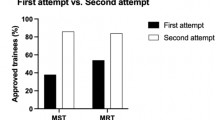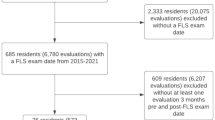Abstract
Background
Outside the US, FLS certification is not required and its teaching methods are not well standardized. Even if the FLS was designed as “stand alone” training system, most of Academic Institution offer support to residents during training. We present the first systematic application of FLS in Italy.
Our aim was to evaluate the role of mentoring/coaching on FLS training in terms of the passing rate and global performance in the search for resource optimization.
Methods
Sixty residents in general surgery, obstetrics & gynecology, and urology were selected to be enrolled in a randomized controlled trial, practicing FLS with the goal of passing a simulated final exam. The control group practiced exclusively with video material from SAGES, whereas the interventional group was supported by a mentor.
Results
Forty-six subjects met the requirements and completed the trial. For the other 14 subjects no results are available for comparison. One subject for each group failed the exam, resulting in a passing rate of 95.7%, with no obvious differences between groups. Subgroup analysis did not reveal any difference between the groups for FLS tasks.
Conclusion
We confirm that methods other than video instruction and deliberate FLS practice are not essential to pass the final exam. Based on these results, we suggest the introduction of the FLS system even where a trained tutor is not available. This trial is the first single institution application of the FLS in Italy and one of the few experiences outside the US.
Trial Number: NCT02486575 (https://www.clinicaltrials.gov).



Similar content being viewed by others
References
Hutter MM, Kellogg KC, Ferguson CM, Abbott WM, Warshaw AL (2006) The impact of the 80-h resident workweek on surgical residents and attending surgeons. Ann Surg 243:864–871
Palter VN, Grantcharov TP (2014) Individualized deliberate practice on a virtual reality simulator improves technical performance of surgical novices in the operating room: a randomized controlled trial. Ann Surg 259:443–448
Peters JH, Fried GM, Swanstrom LL, Soper NJ, Sillin LF, Schirmer B, Hoffman K, SAGES FLS Committee (2004) Development and validation of a comprehensive program of education and assessment of the basic fundamentals of laparoscopic surgery. Surgery 135: 21–27
Zendejas B, Ruparel RK, Cook DA (2016) Validity evidence for the fundamentals of laparoscopic surgery (FLS) program as an assessment tool: a systematic review. Surg Endosc 30:512–520
Soper NJ, Fried GM (2008) The fundamentals of laparoscopic surgery: its time has come. Bull Am Coll Surg 93:30–32
Giannotti D, Casella G, Patrizi G, Di Rocco G, Castagneto-Gissey L, Metere A, Bernieri MG, Vestri AR, Redler A (2015) Spider surgical system versus multiport laparoscopic surgery: performance comparison on a surgical simulator. BMC Surg 15:54
Bedada AG, Hsiao M, Bakanisi B, Motsumi M, Azzie G (2015) Establishing a contextually appropriate laparoscopic program in resource-restricted environments experience in Botswana. Ann Surg 261:807–811
Okrainec A, Smith L, Azzie G (2009) Surgical simulation in Africa: the feasibility and impact of a 3-day fundamentals of laparoscopic surgery course. Surg Endosc 23:2493–2498
Laubert T, Esnaashari H, Auerswald P, Höfer A, Thomaschewski M, Bruch HP, Keck T, Benecke C (2017) Conception of the Lübeck toolbox curriculum for basic minimally invasive surgery skills. Langenbecks Arch Surg. https://doi.org/10.1007/s00423-017-1642-1
Esposito C, Escolino M, Saxena A, Montupet P, Chiarenza F, De Agustin J, Draghici IM, Cerulo M, Sagaon MM, Di Benedetto V, Gamba P, Settimi A, Najmaldin A (2015) European Society of Pediatric Endoscopic Surgeons (ESPES) guidelines for training program in pediatric minimally invasive surgery. Pediatr Surg Int 31(4):367–373
Goldin SB, Horn GT, Schnaus MJ, Grichanik M, Ducey AJ, Nofsinger C, Hernandez DJ, Shames ML, Singh RP, Brannick MT (2014) FLS skill acquisition: a comparison of blocked vs interleaved practice. Surg Educ 71:506–512
Cassera MA, Zheng B, Swanström LL (2012) Data-based self-study guidelines for the fundamentals of laparoscopic surgery examination. Surg Endosc 26:3426–3429
Orzech N, Palter VN, Reznick RK, Aggarwal R, Grantcharov TP (2012) A comparison of 2 ex vivo training curricula for advanced laparoscopic skills: a randomized controlled trial. Ann Surg 255:833–839
Bonrath EM, Dedy NJ, Gordon LE, Grantcharov TP (2015) Comprehensive surgical coaching enhances surgical skill in the operating room: a randomized controlled trial. Ann Surg 262:205–212
Mutabdzic D, Mylopoulos M, Murnaghan ML, Patel P, Zilbert N, Seemann N, Regehr G, Moulton CA (2015) Coaching surgeons: is culture limiting our ability to improve? Ann Surg 262:213–216
Greenberg CC, Klingensmith ME (2015) The continuum of coaching: opportunities for surgical improvement at all levels. Ann Surg 262:217–219
Singh P, Aggarwal R, Tahir M, Pucher PH, Darzi A (2015) A randomized controlled study to evaluate the role of video-based coaching in training laparoscopic skills. Ann Surg 261:862–869
Placek SB, Franklin BR, Haviland SM, Wagner MD, O’Donnell MT, Cryer CT, Trinca KD, Silverman E, Matthew Ritter E (2017) Outcomes of fundamentals of laparoscopic surgery (FLS) mastery training standards applied to an ergonomically different, lower cost platform. Surg Endosc 31:2616–2622
Franklin BR, Placek SB, Wagner MD, Haviland SM, O’Donnell MT, Ritter EM (2017) Cost comparison of fundamentals of laparoscopic surgery training completed with standard fundamentals of laparoscopic surgery equipment versus low-cost equipment. J Surg Educ 74:459–465
Boyd T, Jung I, Van Sickle K, Schwesinger W, Michalek J, Bingener J (2008) Music experience influences laparoscopic skills performance. JSLS 12:292–294
Madan AK, Frantzides CT, Park WC, Tebbit CL, Kumari NV, O’Leary PJ (2005) Predicting baseline laparoscopic surgery skills. Surg Endosc 19:101–104
Kolozsvari NO, Kaneva P, Brace C, Chartrand G, Vaillancourt M, Cao J, Banaszek D, Demyttenaere S, Vassiliou MC, Fried GM, Feldman LS (2011) Mastery versus the standard proficiency target for basic laparoscopic skill training: effect on skill transfer and retention. Surg Endosc 25:2063–2070
Gallagher AG, Satava RM (2015) Surgical simulation: seeing the bigger picture and asking the right questions. Ann Surg 262:e50–e51
Kowalewski TM, White LW, Lendvay TS, Jiang IS, Sweet R, Wright A, Hannaford B, Sinanan MN (2014) Beyond task time: automated measurement augments fundamentals of laparoscopic skills methodology. J Surg Res 192:329–338
Cavallo F, Pietrabissa A, Megali G, Troia E, Sinigaglia S, Dario P, Mosca F, Cuschieri A (2012) Proficiency assessment of gesture analysis in laparoscopy by means of the surgeon’s musculo-skeleton model. Ann Surg 255:394–398
Stefanidis D, Yonce TC, Korndorffer JR (2013) Does the incorporation of motion metrics into the existing FLS metrics lead to improved skill acquisition on simulators? A single blinded, randomized controlled trial. Ann Surg 258:46–52
Aggarwal R, Grantcharov T, Moorthy K, Hance J, Darzi A (2006) A competency-based virtual reality training curriculum for the acquisition of laparoscopic psychomotor skill. Am J Surg 191:128–133
Brunner WC, Korndorffer JR, Sierra R, Massarweh NN, Dunne JB, Yau CL, Scott DJ (2004) Laparoscopic virtual reality training: are 30 repetitions enough? J Surg Res 122:150–156
Gallagher AG, Ritter EM, Champion H, Higgins G, Fried MP, Moses G, Smith CD, Satava RM (2005) Virtual reality simulation for the operating room: proficiency-based training as a paradigm shift in surgical skills training. Ann Surg 241:364–372
Brinkman WM, Buzink SN, Alevizos L, de Hingh IH, Jakimowicz JJ (2012) Criterion-based laparoscopic training reduces total training time. Surg Endosc 26:1095–1101
Acknowledgements
The authors are grateful to all the residents who participated in this TRIAL. We would like to express sincere gratitude to Luisa Ciullo, Director of the administrative operations at our Institution, for the coordination and the logistic support.
Funding
No funds received for this study.
Author information
Authors and Affiliations
Corresponding author
Ethics declarations
Disclosures
Federico Gheza, Paolo Raimondi, Leonardo Solaini, Federico Coccolini, Gian Luca Baiocchi, Nazario Portolani, and GuidoAlberto Massimo Tiberio have no conflicts of interest or financial ties to disclose.
Rights and permissions
About this article
Cite this article
Gheza, F., Raimondi, P., Solaini, L. et al. Impact of one-to-one tutoring on fundamentals of laparoscopic surgery (FLS) passing rate in a single center experience outside the United States: a randomized controlled trial. Surg Endosc 32, 4428–4435 (2018). https://doi.org/10.1007/s00464-018-6185-1
Received:
Accepted:
Published:
Issue Date:
DOI: https://doi.org/10.1007/s00464-018-6185-1




